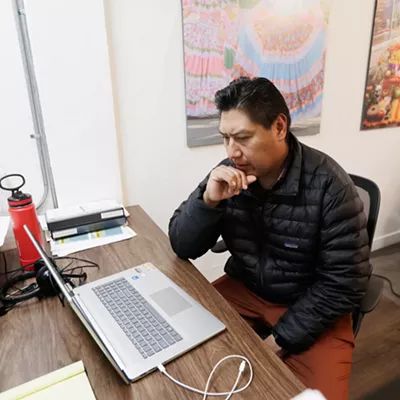Being the second most powerful woman in the state has its perks. Sure, Senate Majority Leader Lisa Brown (D-Spokane) will have to face another budget deficit in the upcoming legislative session. But it also means that when the Center for Women in Democracy needs someone to lead a trip to Morocco, Brown is at the top of the list.
The senator departed for Casablanca earlier this month with a diverse group of 38 women from business and human rights organizations — including Eastern professor Patty Chantrill and Jaime Hawk of the Spokane County Public Defender office — for seven days of meetings, sightseeing and an intercultural exploration of the role of women in society.
She spoke with The Inlander once the jet lag wore off.
INLANDER: It seemed like a busy week. Give us a sense of your itinerary.
BROWN: We flew into Casablanca. We started in the capital city of Rabat. And we also went to Fez and up into the countryside.
We met with everyone from members of Parliament — women who have been elected recently — to women’s rights organizations and co-ops. We met with a Peace Corps volunteer at a co-op she was working with in a rural area, where the women were, for the first time, selling their traditional weaving and earning income. The very last night, we met with the Moroccan Secretary of State, who is a woman.
For an Arab country, Morocco seems relatively progressive in terms of women’s rights.
It is. It’s ahead of other Arab countries in terms of the percentage of women who have been elected to office, both at the local level and at the parliament level. The king has been supportive of this movement. And they have brought about some changes in the family code, which are fairly progressive for the Arab world and for a Muslim country, such as granting women the right to divorce, have custody of their children, own property et cetera.
What was it like for you as a woman, traveling with a large group of women?
The group got along really well, and we were really impressed with the determination of the Moroccan women. I would say that one of the stereotypes for me that was firmly put to rest was the idea that a woman wearing the hijab — or veil — is somehow more repressed or controlled than women in Western dress. What I found was there was a wide variety of thinking underneath the veil, if you will.
Although obviously there were people who are very traditional and practiced their religion very ritually — praying five times a day and things like that — there were other people who were much more casual about practicing their religion. I would say just the way you would find with Christians in the United States.
Any lessons to bring back to the States?
Well, it’s gonna take me a little while to absorb it all. I found that there are similarities in the kinds of issues women are working on. They may not be as far along in addressing, for example, family violence and shelters for women, but it’s a universal problem, regardless of what country you’re in.
And I also found that it makes sense not to take things for granted. In the U.S., we actually have been re-trenching a little bit, in terms of women in elected office. In Washington state, where we used to be the leader in the country, we’ve gone back to like five or six. I’ve found it’s something you can’t take for granted. It requires discussion. And I think that women in different countries can learn from each other.
Any trip highlights?
Well, I love the culture. The architecture is just stunning, and the craftsmanship of the tile work and the mosaics that they do. So it just visually knocked me out every day. And the food was incredible, and the people’s hospitality was also very generous.
I
went to an interesting university that was created, ironically, because
of a Saudi Arabian oil spill, and they gave money to the Moroccan
government and it was agreed that they could start a university with
it. It’s an English-speaking university that ironically reminded me a
lot of Gonzaga. And there was a Gonzaga alum there working at the
Hillary Rodham Center for Women’s Empowerment. And the students there
put together a video about what they’d like to be doing in the year
2030. And it was just fantastic. They were thinking big, which was
great to see.
For more on Lisa Brown’s Morocco trip, visit her Senate blog at Senatedemocrats.wa.gov





















